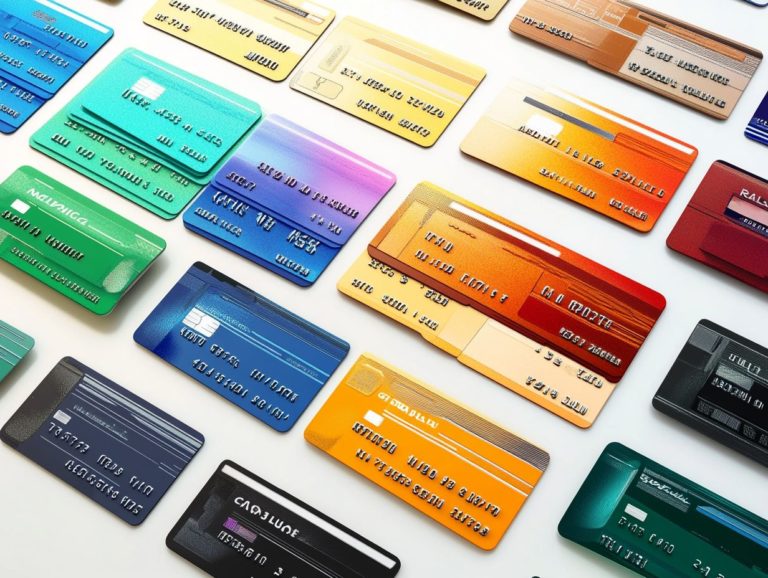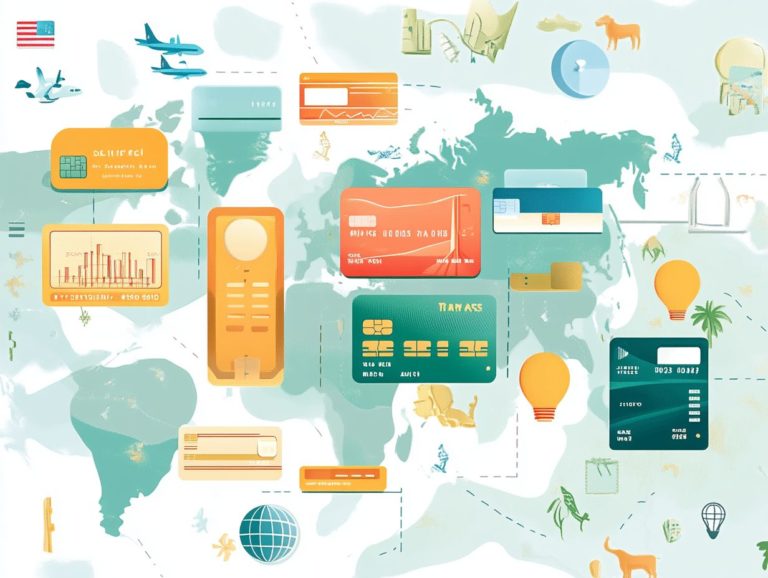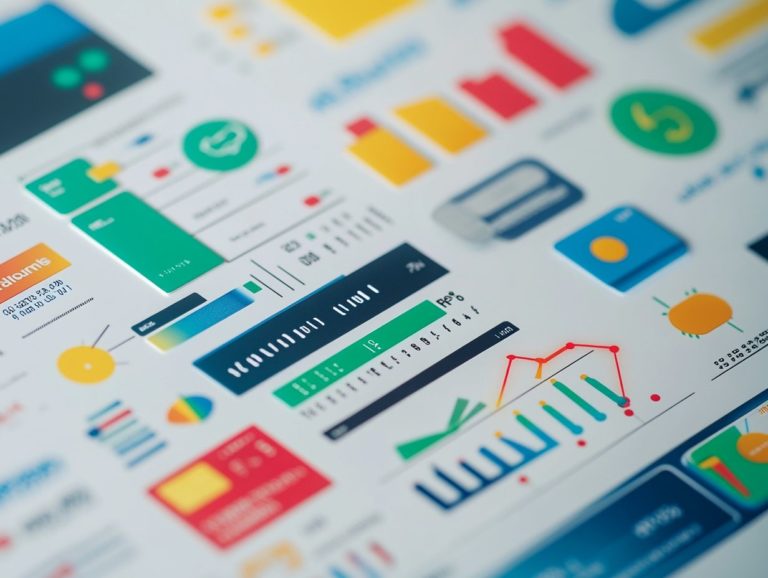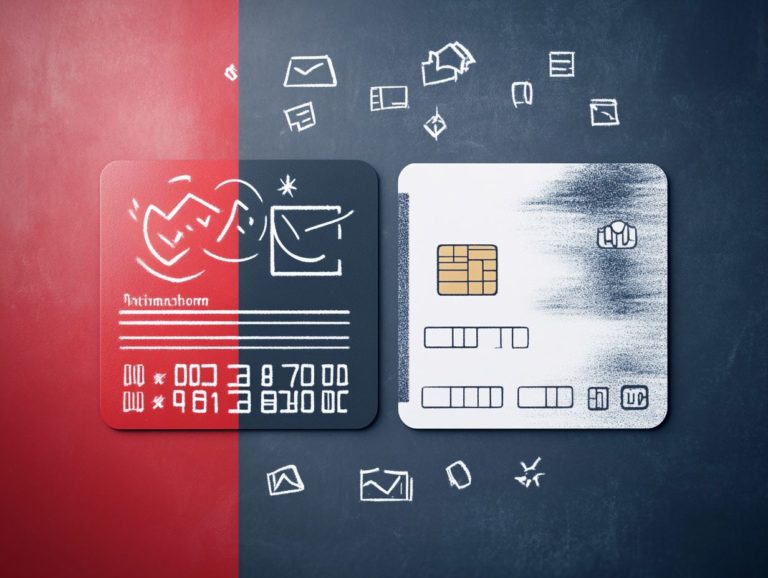Business vs. Personal Credit Cards: Key Differences
Understanding credit cards opens up new financial opportunities for you. Whether you re managing a business or your personal finances, this knowledge is key.
This article explores the differences between business and personal credit cards. It highlights their unique features and advantages.
You ll find a thorough examination of the pros and cons of each type. This will help you determine what aligns best with your needs.
You ll also receive valuable tips on selecting the right card. This empowers you to make informed and responsible choices.
Dive in and discover how to navigate the credit landscape!
Contents
- Key Takeaways:
- What are Credit Cards?
- Business Credit Cards vs. Personal Credit Cards
- Pros and Cons of Using Business Credit Cards
- Pros and Cons of Using Personal Credit Cards
- Factors to Consider When Choosing a Credit Card
- Maximizing the Benefits of Credit Cards
- Frequently Asked Questions
- What is the main difference between business and personal credit cards?
- Can I use a personal credit card for my business expenses?
- Do business credit cards offer higher credit limits?
- Do business credit cards affect my personal credit score?
- What are the benefits of using a business credit card instead of a personal credit card?
- Can I transfer a balance from my personal credit card to a business credit card?
Key Takeaways:
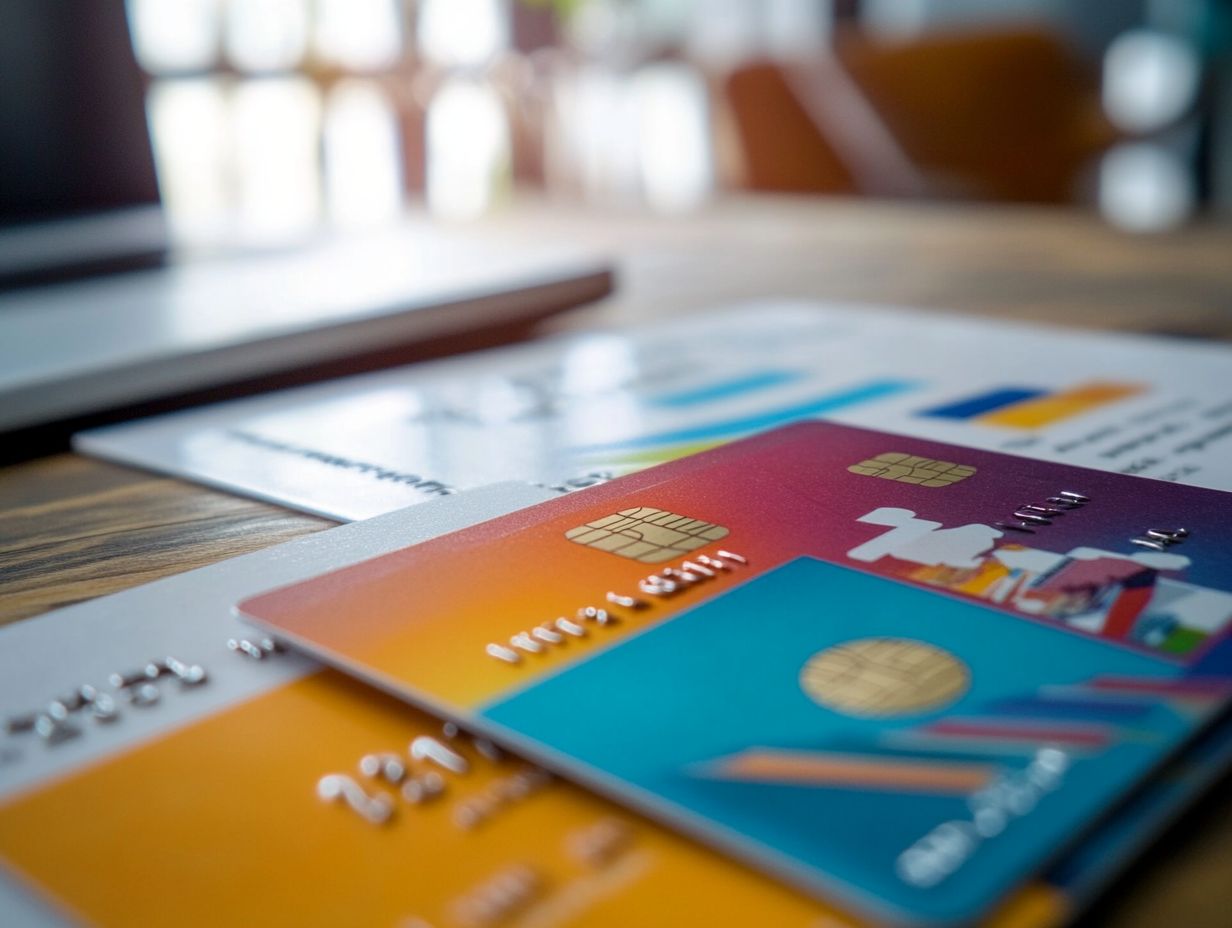
- Business credit cards have features tailored for business use, like expense tracking and employee spending limits. Personal credit cards focus more on rewards for everyday spending.
- Using a business credit card can help you separate personal and business expenses. However, it might impact your business credit score and your liability as a business owner.
- Personal credit cards can be more convenient for individuals. But they may come with higher interest rates, putting your credit score at risk if not used wisely.
What are Credit Cards?
Credit cards are powerful financial tools. They let you buy now and pay later, giving you more flexibility with your money.
They come in various forms, like business credit cards designed for small business owners. These often offer better rewards and higher limits compared to personal credit cards.
Understanding the differences helps you make informed financial decisions that fit your goals.
Business Credit Cards vs. Personal Credit Cards
When deciding between a business credit card and a personal one, it’s crucial to understand how business credit cards affect personal credit and the key differences in features and benefits. This is especially important for small business owners.
Business credit cards address specific needs, offering enhanced rewards and higher limits. Personal credit cards, on the other hand, are mainly for individual consumers.
Recognizing these differences empowers you to make a choice that best serves your financial goals.
Key Differences in Features and Benefits
The features and benefits of business credit cards stand apart from personal cards. They offer exclusive perks like higher limits and tailored spending categories.
These advantages can lead to better rewards and improved financial management. It’s essential to evaluate which option fits your financial goals.
As you explore these cards, look for enticing introductory offers. They can boost your savings, along with strong cash back programs that reward everyday spending.
For example, some business credit cards excel in categories like office supplies or travel, areas where entrepreneurs often spend.
By leveraging these spending categories, you can maximize rewards and improve cash flow. This allows you to reinvest more into your business.
Comparing similar cards will help you find the one that matches your spending habits. This way, you can tap into the full potential of your credit options.
Pros and Cons of Using Business Credit Cards
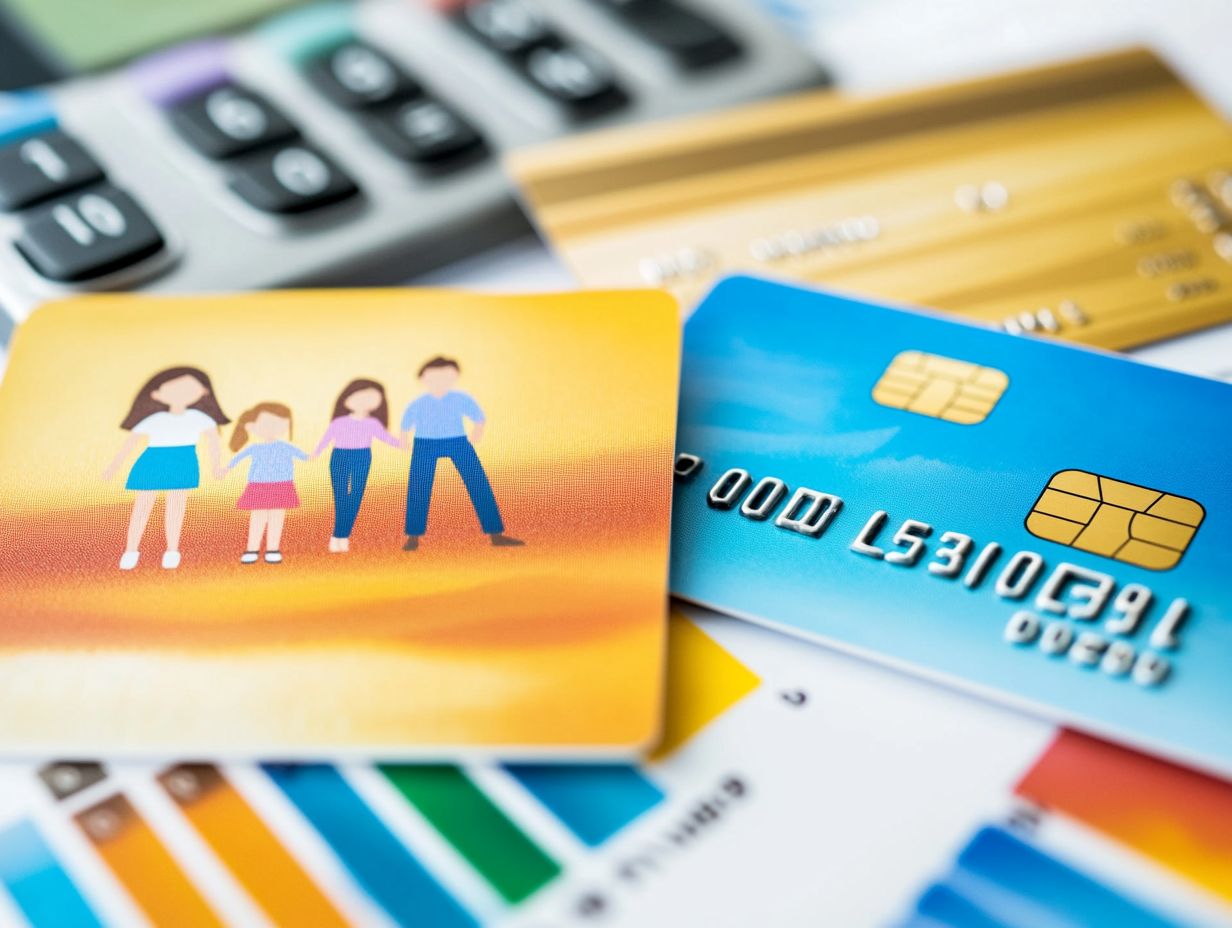
Utilizing business credit cards brings a variety of advantages and disadvantages that can profoundly influence your decisions as a business owner.
On one hand, these cards provide enhanced financial flexibility, attractive rewards, and the crucial ability to separate business expenses. All of these can positively contribute to your business credit score.
Watch out for the possible downsides! You might face the temptation to overspend and the need to meet certain income requirements. Balancing these factors is essential for making informed choices that align with your business goals.
Advantages and Disadvantages for Businesses
Using business credit cards presents a mixed bag of advantages and disadvantages that can greatly impact your financial strategies.
On the plus side, you can access features like employee cards, which simplify expenses, and earn enticing rewards, especially during tax season.
However, be mindful of downsides such as fees and the potential for accruing debt if you don t manage your spending carefully.
With business credit cards, tracking expenses becomes a breeze. You can analyze your spending patterns and optimize your budgets with ease.
Additionally, these cards often have strong reward programs, allowing you to save on travel, office supplies, and other essential business costs.
Many businesses report average savings of 10-15% simply by taking advantage of cash-back options.
It s essential to stay vigilant about potential overspending; around 40% of small businesses have cited mismanaged credit lines as a key reason for their financial woes.
Understanding your income requirements is crucial for maintaining a healthy financial standing and avoiding complications related to how much of your credit limit you are using.
Pros and Cons of Using Personal Credit Cards
Personal credit cards present a distinctive array of advantages and disadvantages that can significantly shape your financial management and credit scores.
They typically provide greater accessibility for daily purchases and often come with enticing rewards programs.
However, it’s essential to remain vigilant about their impact on your credit score and the risk of overspending, which requires a thoughtful and responsible approach to usage.
Advantages and Disadvantages for Individuals
Understanding the advantages and disadvantages of using a personal credit card can greatly shape your spending habits and impact your credit history.
On one hand, you enjoy the convenience and the enticing possibility of earning cash back or rewards.
On the other hand, you face potential pitfalls like overspending, interest charges, and the risk of harming your credit score if you’re not careful.
Many credit cards come with attractive promotional introductory offers, such as 0% APR (Annual Percentage Rate, meaning you won t pay interest) for the first year.
This can be particularly advantageous if you re planning to make a significant purchase or manage existing debt without accumulating interest.
Such offers can alleviate financial pressure, allowing you to pay off your balances gradually while building a positive credit history.
However, it s crucial to stay aware of potential traps, like accumulating debt if you find yourself living beyond your means.
If you re drawn in by cashback rewards, you might be tempted to spend more, inadvertently putting yourself in a financially precarious situation.
This could lead to stress and missed payments, ultimately jeopardizing your credit profile.
Factors to Consider When Choosing a Credit Card
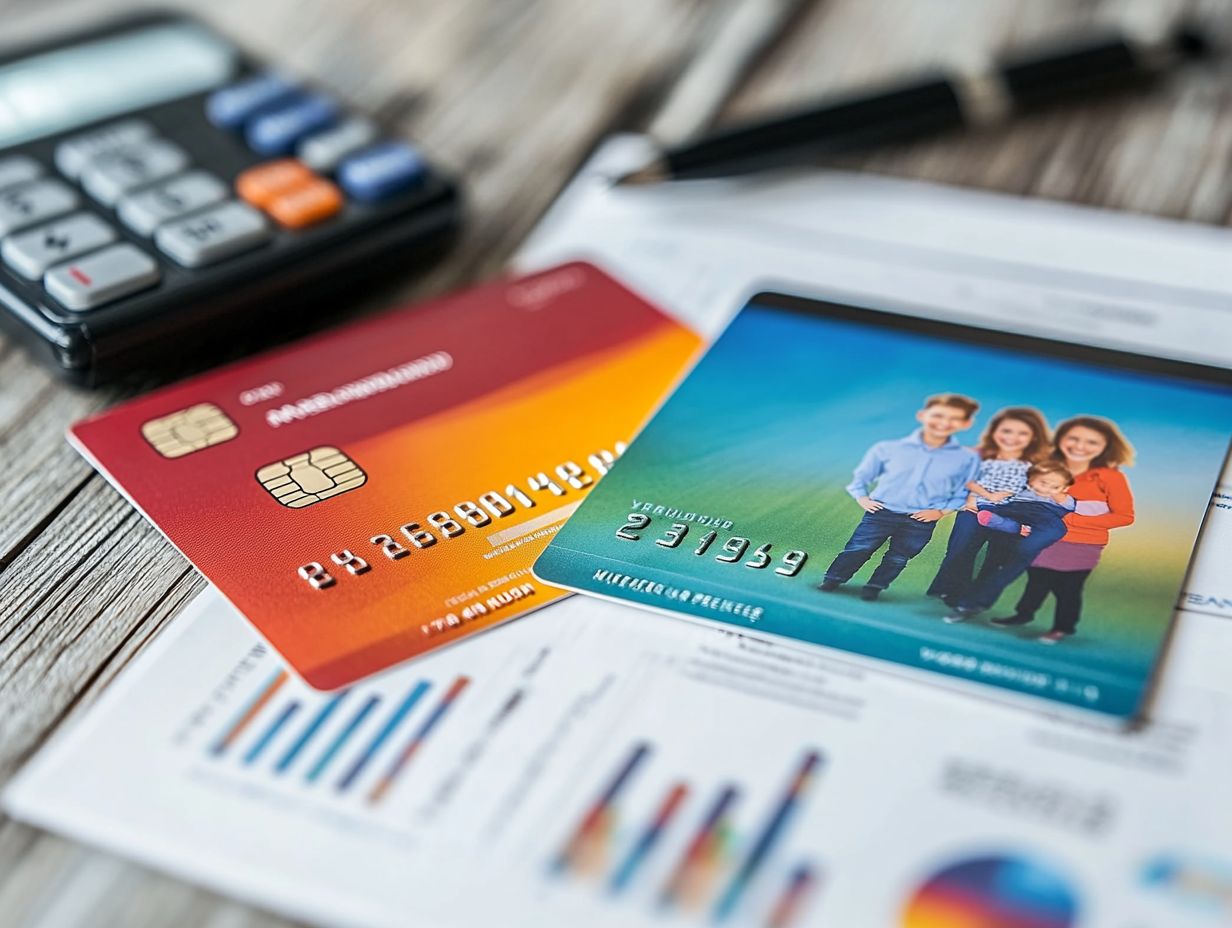
Selecting the ideal credit card requires careful consideration of several crucial factors that resonate with your personal or business spending habits and financial ambitions.
It’s essential to grasp the income requirements, evaluate the various rewards programs available, and assess how the card will influence your overall financial flexibility and credit scores.
Each of these elements plays a significant role in ensuring your choice aligns seamlessly with your financial strategy.
Assessing Your Needs and Goals
Assessing your needs and goals is essential when selecting the right credit card. This choice can enhance your financial flexibility.
Consider your spending habits and how frequently you travel. Which rewards or perks align best with your financial objectives?
By taking a closer look at these factors, you can craft a budget that truly reflects your lifestyle and priorities. Tracking your current expenses will unveil patterns that could unlock opportunities for maximizing benefits from credit card rewards programs.
For example, if dining out is a regular part of your routine, opting for a card that offers cashback or points on restaurant purchases can lead to significant savings.
Regularly reviewing and adjusting your financial plans encourages smarter spending and helps you prioritize essentials over luxuries. This ensures your overall financial health remains robust.
Maximizing the Benefits of Credit Cards
To truly maximize the benefits of your credit cards, a strategic approach is essential. This approach should prioritize responsible usage and effective financial planning.
By using rewards programs, understanding different spending types, and taking advantage of special offers, you can enhance your credit card experience and align it with your financial aspirations.
Whether for personal use or business needs, optimizing these tools will help you achieve your goals with finesse.
Tips for Responsible Credit Card Use
Practicing responsible credit card use is crucial for effectively managing your finances and maintaining a strong credit score. This means budgeting thoughtfully, tracking your spending, and using credit cards primarily for essential expenses.
By doing so, you’ll avoid falling into debt while still reaping the rewards and benefits.
Along with these essential habits, setting clear spending limits can help you stay within budget and maintain financial discipline. For instance, if you designate a specific amount each month for groceries and entertainment, sticking to this cap will help you resist the temptation of impulse purchases.
Regularly monitoring your credit reports is equally important. By checking these reports frequently, you can swiftly spot any discrepancies or areas that need improvement. Over time, employing these strategies not only encourages responsible spending but also significantly contributes to building a robust credit history.
This, in turn, paves the way for better loan options and lower interest rates in the future.
Frequently Asked Questions
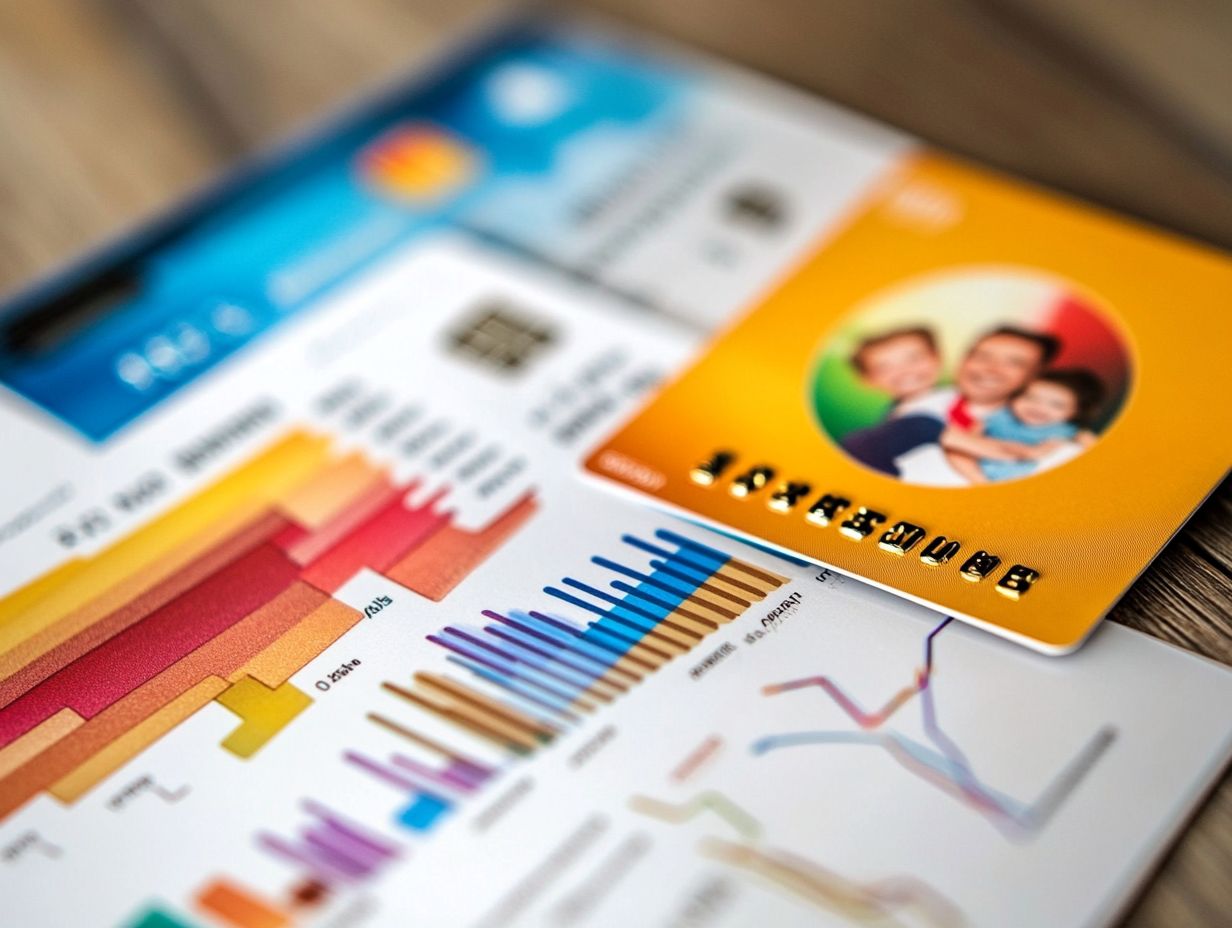
What is the main difference between business and personal credit cards?
The main difference between business and personal credit cards is that business credit cards are specifically designed for businesses. They come with features and benefits tailored to business needs, while personal credit cards are designed for individual use.
Can I use a personal credit card for my business expenses?
Yes, you can use a personal credit card for business expenses, but it is not recommended. Using a personal credit card for business expenses can lead to confusion and make it difficult to track your business expenses separately from personal expenses.
Do business credit cards offer higher credit limits?
Yes, business credit cards typically offer higher credit limits compared to personal credit cards. This is because businesses usually have higher expenses and may require a larger credit line to cover them.
Do business credit cards affect my personal credit score?
Most business credit cards do not report to personal credit bureaus, so they do not directly affect your personal credit score. However, if you personally guarantee the credit card or use it for personal expenses, it may have an indirect impact on your personal credit score.
What are the benefits of using a business credit card instead of a personal credit card?
Some benefits of using a business credit card include higher credit limits, rewards and perks specifically designed for businesses, and the ability to separate business and personal expenses for easier tracking and tax purposes.
Can I transfer a balance from my personal credit card to a business credit card?
You can transfer a balance from a personal credit card to a business credit card. However, it s usually not the best choice.
Business credit cards often come with higher interest rates and fees. Mixing personal and business expenses can also create confusion.
Are you considering a balance transfer? It s important to weigh your options carefully.

